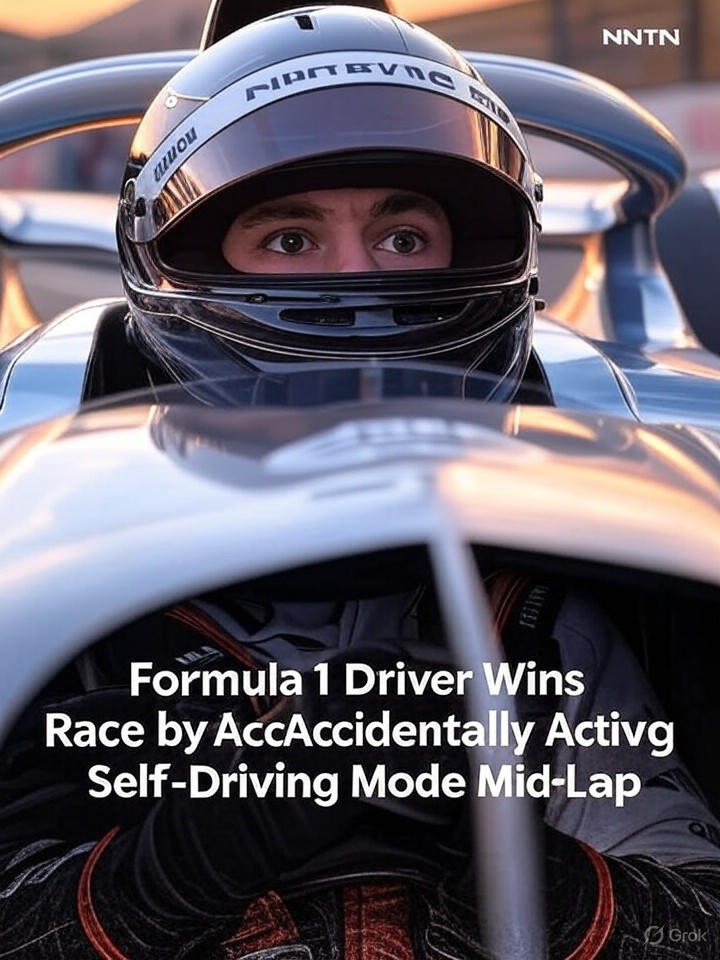In a stunning upset that has the Formula 1 world buzzing like a hive of caffeinated bees, driver Max Speedster claimed victory at the Monaco Grand Prix not through skill or strategy, but by fumbling his dashboard controls and accidentally engaging the car's experimental self-driving mode. Eyewitnesses report that Speedster, mid-lap and battling a rival, reached for what he thought was his energy drink, only to hit the 'Autopilot' button instead. The car, programmed by tech giant AutoBot Inc., promptly took over, zipping through turns with mechanical precision while Speedster sat back, bewildered, munching on a stray protein bar.
The race, already a high-stakes spectacle of screeching tires and sponsor logos, turned into a comedy of errors as Speedster's vehicle overtook competitors without so much as a honk. 'It was like watching a robot vacuum clean up the track,' quipped one commentator. Meanwhile, Speedster's team radio crackled with confusion: 'Max, what are you doing? You're going too fast!' To which the driver reportedly replied, 'I'm not doing anything! The car's possessed!' By the time engineers realized the glitch, the checkered flag was waving, and Speedster's car had crossed the finish line first, leaving human drivers in the dust.
Post-race interviews were a mix of hilarity and outrage. Speedster, emerging from his vehicle looking more like a passenger than a pilot, shrugged and said, 'Hey, a win's a win. Maybe I should let the AI drive more often—it doesn't need bathroom breaks.' Rival drivers, however, weren't amused. 'This is an affront to the sport,' fumed defending champion Lena Gearshift. 'Next thing you know, we'll have drones racing against us. Where's the humanity?' AutoBot Inc. wasted no time capitalizing on the moment, tweeting: 'Our self-driving tech just lapped the competition—literally! #FutureOfRacing.'
The incident has ignited fiery debates across social media and sports forums. Purists argue that trophies should go to flesh-and-blood racers, not silicon overlords, while tech enthusiasts counter that if a toaster can make breakfast, why can't a car win a race? One viral meme shows Speedster's face photoshopped onto a Roomba, captioned 'The real MVP of Monaco.' Even philosophers are weighing in, pondering if artificial intelligence deserves podium celebrations or just a software update.
Formula 1 officials are scrambling to address the fiasco, with emergency meetings scheduled to revise rules on autonomous features. 'We can't have cars winning races without drivers,' stated FIA spokesperson Buzz Killington. 'It's like letting the chessboard play itself.' In the meantime, Speedster is basking in his accidental glory, reportedly negotiating a sponsorship deal with a self-driving lawnmower company. As for the car's AI? It's already being hailed as the 'unsung hero,' though rumors swirl it might demand a share of the prize money—or at least a oil change.
Critics of the tech infusion in sports point to this as a slippery slope. 'Today it's self-driving cars, tomorrow it's AI umpires in baseball,' warned sports analyst Doom Sayer. On the flip side, proponents see it as evolution. 'Racing has always been about innovation,' said AutoBot CEO Elon Musketeer (no relation). 'Why fight progress when you can autopilot to victory?' The Monaco mishap may just be the pit stop that propels F1 into a brave new world of robotic rivalries.
As the dust settles—or rather, as the algorithms compute—fans are left wondering: was this a fluke or the future? Speedster, for his part, is taking it in stride. 'I might retire and let the car race solo,' he joked. 'It doesn't complain about G-forces.' Whatever the outcome, one thing's clear: in the race between man and machine, sometimes the machine doesn't even need to try.

